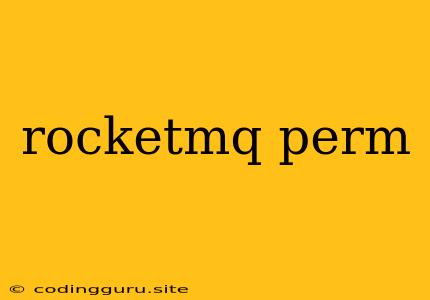Understanding and Mastering RocketMQ Permissions (Perm)
RocketMQ, a high-performance, distributed messaging system, provides powerful features for message queuing and reliable delivery. However, with its complex architecture and extensive capabilities, it becomes crucial to understand and manage permissions (perm) effectively. This article will explore RocketMQ permissions and provide guidance on how to secure your messaging infrastructure.
What are RocketMQ Permissions?
Permissions in RocketMQ refer to the access control mechanisms that determine who can perform specific operations within the system. These operations include:
- Creating topics: Defining new message channels for message exchange.
- Producing messages: Publishing messages to existing topics.
- Consuming messages: Subscribing to topics and receiving messages.
- Administering queues: Managing queues, such as creating, deleting, and assigning producers and consumers.
- Monitoring and managing the RocketMQ cluster: Viewing system metrics and configuring the cluster.
Why are Permissions Important?
Permissions are essential for several reasons:
- Security: Permissions help protect your RocketMQ cluster from unauthorized access, preventing malicious activities and ensuring data integrity.
- Resource management: Permissions enable you to control access to specific topics and queues, allowing you to optimize resource utilization.
- Collaboration: Permissions allow you to define different levels of access for various users or teams, facilitating collaborative use of the RocketMQ platform.
How to Manage RocketMQ Permissions
RocketMQ offers different approaches for managing permissions:
1. Access Control Lists (ACLs)
ACLs are the primary mechanism for controlling access to RocketMQ resources. They define rules that specify which users or groups are allowed to perform certain actions on topics, producers, consumers, or the entire cluster. ACLs are configured through the RocketMQ console or via the command-line interface.
Example of an ACL rule:
{
"topic": "MyTopic",
"acl": {
"group": "AdminGroup",
"permission": "WRITE"
}
}
This rule grants the "AdminGroup" permission to write messages to the topic "MyTopic."
2. Role-Based Access Control (RBAC)
RBAC is a more granular approach to permission management. It defines roles with specific sets of permissions that can be assigned to users. This allows for flexible and efficient management of access rights within a large organization.
Example of an RBAC role:
{
"role": "ProducerAdmin",
"permissions": [
"CREATE_TOPIC",
"PRODUCE_MESSAGE"
]
}
This role, "ProducerAdmin," grants the ability to create new topics and produce messages.
3. Authentication
Authentication is a crucial aspect of permission management. It verifies the identity of users or applications before granting them access to RocketMQ resources. RocketMQ supports various authentication mechanisms, including:
- Basic authentication: Using username and password.
- Token authentication: Using access tokens for secure authentication.
- SSL/TLS: Encrypted communication for enhanced security.
Best Practices for RocketMQ Permissions
- Use the Principle of Least Privilege: Grant only the necessary permissions to users or groups.
- Regularly Audit Permissions: Periodically review permissions to ensure they remain appropriate and secure.
- Implement Strong Authentication: Use robust authentication mechanisms to prevent unauthorized access.
- Separate Roles and Responsibilities: Assign distinct roles to users based on their responsibilities.
- Monitor System Activity: Track access logs to identify any suspicious activity.
Conclusion
Permissions are crucial for securing your RocketMQ infrastructure and ensuring responsible use. By understanding and implementing effective permission management techniques, you can safeguard your messaging system, optimize resource allocation, and foster collaboration while maintaining a secure and reliable environment.
